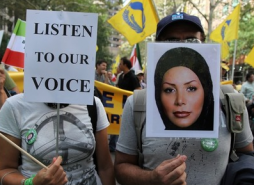A video filmed on a mobile phone made history when it won the George Polk Award for Journalism this year. Not only was it the first video to win in the newly-created videography category, it was also the first video in the Polk's 61-year history awarded to an anonymous citizen journalist.
The video shows the death of Neda Agha-Soltan, a young Iranian woman shot and killed during the protests in June 2009 following the Iranian elections. After the release of the video, news organizations around the world took note. Hundreds of thousands of viewers have seen the video of the young woman's death and it galvanized protests around the world. The press release from the Polk Awards describes the video:
The George Polk Award for Videography will recognize the efforts of the people responsible for recording the death of 26-year-old Neda Agha-Soltan at a June protest in Tehran, Iran, and uploading the video to the Internet. Ms. Agha-Soltan reportedly was shot by a pro-government militiaman. The video, which shows the woman collapsing to the ground and being attended to by several men as she lay dying on the street, became a rallying point for the reformist opposition in Iran after it was broadcast over the Internet. Seen by millions as it spread virally across the Web, the images quickly gained the attention of international media.
What does awarding a journalism prize for an anonymous cell phone video mean for citizen journalists and reporters? In an interview with WNYC’s On The Media, John Darnton, the curator of the Polk Awards, explains how citizen journalism and mobile phones are changing the face of journalism:
BOB GARFIELD: Now, I don't want to diminish the power of this video, but I must ask you this: If I see a bank robbery through the glass of a window and dial 911, I am a good citizen, but I'm not a detective. If the person who recorded this was simply a civilian who happened to be in the wrong place at the right time, does that make him or her worthy of a journalism prize?
JOHN DARNTON: Well, that is the big question, isn't it? The George Polk Awards, after all, are means of honoring professional journalists. Throughout our 60 year history, that’s what we've done. But in this case, we felt that it was time to, in a sense, say we're all in a new world now. Yes, there are professionals out there, but there are also people I call bystanders who are capable of recording important events, in this case, just with a camera on a cell phone, and transmitting it to the outside world. There’s no reason if what they actually send out there has news value that they should not be considered, I think, for an award.
Cell phones are a way to not only capture content quickly, but also to disseminate it. In the case of the Neda video, the video was initially emailed to recipients in other countries with the hope that those outside Iran could upload the video to the Internet without restrictions. It was uploaded to YouTube where it rapidly gained attention. At the time of this writing, however, the video is not viewable on YouTube. A version of the video is shown here in a CNN report.
Anne-Ryan Heatwole is a writer for MobileActive.org
| Anonymous Cell Phone Video from Iran Wins Journalism Award data sheet 6966 Views | |
|---|---|
| Countries: | Iran |


Post new comment